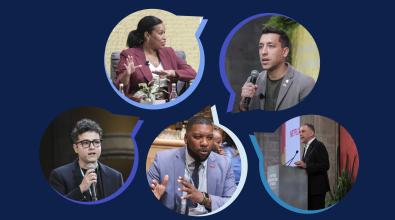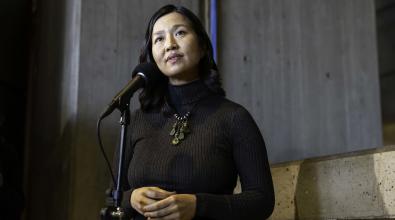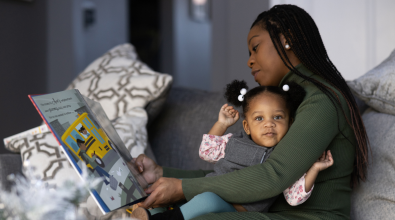Photo essay: Fifteen of these fifty cities will be awarded $1 million
The 50 Champion Cities that have advanced to the finalist stage of the Bloomberg Philanthropies Global Mayors Challenge have spent the past six months refining and building upon some of the boldest urban innovations to emerge from the COVID-19 pandemic. And our team of Bloomberg Cities photographers has chronicled every step, as city leaders tested prototypes of their solutions with residents and made adjustments based on their feedback. The process had them engaging with the public as genuine co-creators and growing their own innovation skills as civil servants. Here, we take one last look at all 50 of these cities before 15 are selected next month to receive $1 million each to further implement their ideas.
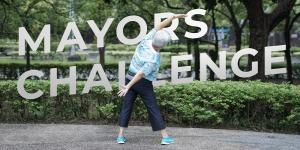

(Photo: Isabelle Stewart)
Akron, USA
Lonnie Kendricks (right) speaks with Ace Epps, Director of Inclusive Entrepreneurship at the Bounce Innovation Hub. Kendricks is launching his own small business, Mirror Memories Photo Booth, and he’s participating in the City of Akron’s program to support 200 new Black-owned businesses. The THRIVE program pairs Black entrepreneurs with a mentor-navigator to help them access resources and financial support. In his role at the innovation hub, Epps oversees the entrepreneurs' progression and advises both the entrepreneurs and their mentor-navigators. Through the program and mentorship, Lonnie has learned how to create a business plan and apply for grants that will help his business flourish.

(Photo: Farah AlQawasmeh)
Amman, Jordan
In Amman, Covid-19 lockdowns shed light on the fact that many residents didn’t have easy access to necessities like water, bread, and medicines. Amman’s topography—the city is built on seven hills— exacerbated the problem. To enhance the city's resilience and crisis response, Amman’s Mayors Challenge team developed reachability maps, in part by partnering with architecture students like the woman above to sketch the city. The team also engaged community members to understand, based on their experience during the pandemic, what resources they needed nearby.

(Photo: Sophie Buist)
Auckland, New Zealand
Three-year-old Danielle Manalo enjoys the māra hūpara (traditional Māori playground). Her mother, Cheilo Manalo, is part of the Mayors Challenge team developing a tool that will allow the city to create more sustainable infrastructure projects like this one. The team created “Together to Net Zero,”, a dashboard to measure the carbon footprint of newly constructed buildings. The tool will not only help Auckland leaders analyze how infrastructure impacts the environment, it also will encourage residents to support low-emissions projects—so children like Danielle can enjoy a more sustainable future.

(Photo: Damon DeBose II)
Baltimore, USA
Business leaders from throughout Baltimore gather to learn more about how they can participate in Baltimore Together, an initiative to support Black-owned businesses in the city. During the pandemic, Black, Indigenous, and people of color (BIPOC)-owned businesses in Baltimore were 40 percent less likely than white-owned businesses to access federal assistance. Through the Mayors Challenge, the city created a network of 19 local organizations to help BIPOC-owned businesses recover and thrive.

(Photo: Iosu Sanchez Reyna)
Bilbao, Spain
Victor Alonso regularly uses the free WiFi that Bilbao offers to all its residents, but he also recognizes that because the system is public an individual hack can make the whole network vulnerable. He says he’ll benefit from the city’s Mayors Challenge program to develop a user-friendly interface that keeps residents like him safe from cyberattacks and malicious software. "I really appreciate that the city council cares about trying to make all of us be part of this constant technological development.” he says.

(Photos: Robert Crawford)
Birmingham, USA
Mayor Randall Woodfin (center) helps plant an urban farm in downtown Birmingham with Rachel Ford (left) of the Jones Valley Teaching Farm. As part of the Mayors Challenge, the city partnered with Jones Valley and other local groups in an effort to expand access to fresh, healthy food to fresh, healthy food. Currently, more than one third of the city’s residents live in neighborhoods that provide that access.

(Photo: Sebastián Orjuela)
Bogota, Colombia
The unpaid care burden falls disproportionately on women in Bogotá, where during COVID, 30 percent of the female population provided unpaid caregiving full time. This burden has staggering consequences: 70 percent of these 1.2 million women haven’t had the opportunity to study past high school and 21 percent suffer from physical and mental-health problems. The city’s Mayors Challenge program offers new supports for these women, including “Care Blocks” where they’re relieved of their day-to-day responsibilities and offered opportunities to engage in education, formal jobs, well-being workshops, and social and political activities. The city has even created a “Care Bus” to help ensure women, such as Karina Sanchez (above) can reach these Care Blocks more easily.

(Photo: Gerald Rago)
Butuan, Philippines
Farmer Lydia Aparri visits Butuan’s new AgriHub, where her produce is being sold. The market is part of the city’s AgriBoost project, which aims to reduce inefficiencies in the agricultural market and improve prices for farmers while increasing resident’s access to affordable, locally grown food. The AgriBoost app allows food buyers like grocery stores and restaurants to place orders far in advance, which—combined with predictive data supplied by the city—helps farmers plan how many crops to plant. It’s a model that the Mayors Challenge team hopes will improve food systems throughout the country.

(Photo: Bafana Songo)
Cape Town, South Africa
Cape Town Executive Mayor Dan Plato (left) stirs a hearty pot of chicken biryani at a community feeding kitchen run by Anne Africa (right) of Hearts of Gold NGO. When the pandemic created a hunger crisis in Cape Town, the city turned to community-run kitchens like this one to serve food to people who needed it. By supplying 300 community kitchens with ingredients and equipment, the city vastly increased the kitchens’ capacity, enabling them to guarantee Cape town residents at least one meal a day. The city is also using the Mayors Challenge to test ways to improve the dining experience for residents by adding tables, chairs, table cloths and gazebos for shade. “We further hope to bring dignity to those making use of the feeding kitchens,” Plato says.

(Photo: Eulalia Castro)
Cartagena, Colombia
A Cartagena resident tries on a mockup of a geolocation bracelet that can help first responders locate and rescue residents in an emergency. The bracelet will be part of a kit the city will distribute to help improve an emergency response during natural disasters and climate-related emergencies. It’s one part of the city’s Mayors Challenge project to improve crisis support, especially to women in under-invested communities, who are disproportionately impacted by gender-based violence and climate-related emergencies. The Mayors Challenge team is also working to empower community actors as first responders, training them to respond to a wide range of emergencies and gather data that can save lives.

(Photo by: Maya Neyman)
Columbus, USA
Savannah Sockwell, who works at SMART Columbus, preps a router before heading out to install the device in the home of a Columbus resident who lacks internet access. During the COVID-19 pandemic, one in four Columbus students were unable to fully participate in class when schools shifted to remote learning. To bridge the digital divide, the city partnered with SMART Columbus to increase access to affordable, quality internet for in-need homes in the community. They hope to serve 400 residents. During the project, Sockwell and the team worked with residents to learn about challenges in the installation process. Learning from residents prompted them to shift their prototype and distribute a new, much more user-friendly device.

(Photo: Choi Se-eun)
Daegu, South Korea
Mayor Young-jin Kwon briefs city officials on a new digital platform that will allow residents of Daegu to easily book city spaces for activities of their own creation. The prototype and plan for the platform was developed as part of the Mayors Challenge project, “Re-permissioning the City.” The easy-to-use digital tool will give the residents of Daegu the power to shape public life by creating social or artistic activities in shared city spaces. The city hopes to encourage a spirit of DIY urbanism in Daegu, through this new platform.

(Photo: City of Danane)
Danane, Cote d'Ivoire
In Danané, old, extremely polluting taxis fill the streets, and it’s difficult for residents to find eco-friendly transportation options that are also affordable. Through the Mayors Challenge, the city has launched a fleet of solar- and electric-powered tricycle taxis that will be subsidized, in part, by providing free rides for new and expectant mothers to health appointments at the local maternity center.

(Photo: Angelina Katsanis)
Durham, USA
Diana Sauceda, a jeweler who runs Joyeria El Tesoro in Durham, holds a flyer about upcoming vaccine events that she received from community healthcare ambassadors. The outreach to the Spanish-speaking community is part of Durham’s Mayors Challenge project to connect historically marginalized communities with supports and services that are outside the city's jurisdiction. The project, which started as a mission to create a WhatsApp group of local community members, has blossomed into a thriving network of community leaders, healthcare workers, and volunteer organizations all with the shared goal of helping the residents of Durham.

(Photos: Yasmin Metz-Johnson)
Freetown, Sierra Leone
Valena McEwan (right) the communications lead for Freetown’s Mayor’s Delivery Unit, speaks to residents at a session to educate residents about the importance of planting trees in the city. Rapid urbanization in Freetown has come at the cost of the loss of hundreds of thousands of trees a year—and that deforestation has increased the risk of regular flooding and landslides. To combat this, the city piloted a program through the Mayors Challenge called “Freetown the Treetown” that gives monetary incentives to plant new trees. The goal is to plant one million trees by the end of 2022.
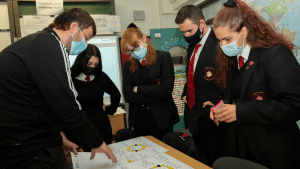
(Photo: Joe Habben)
Glasgow, U.K.
Students share their ideas for fighting climate change at one of the “design jams” that Glasgow City Council and Glasgow Centre for Civic Innovation prototyped for its Mayors Challenge project. The series of “jams” ultimately set out to reimagine the way the city interacts with residents—with the city co-design solutions with residents, rather than just for them. In more than a dozen design sessions, residents of all ages contributed solutions to everything, from redesigning a local skatepark to fighting poverty and preparing for climate change.

(Photo: Víctor Francisco Rivera Saldaña)
Guadalajara, Mexico
Fernando Romo Ledezma, a hairstylist in Guadalajara, lives and works in a part of the city facing rising crime levels and a declining sense of security. He says the higher crime has led to fewer customers for his shop. To increase security levels across the city, the city created a citizen-safety index technology platform to provide real-time information and safety levels to citizens and government officials, allowing them to strategically deploy safety resources. Ledezma, who was one of the residents helping the city develop the platform, praised the city’s efforts to bring people together in their efforts to improve safety. He says the project puts power in the hands of residents.
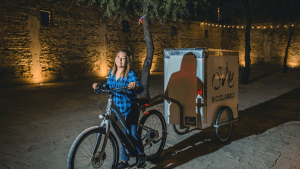
(Photo: Clarissa Bell)
Hermosillo, Mexico
Ana Belén Garcia Felician shows off the bicycle and trailer she was given to gather recyclables as part of Hermosillo’s Biciclando bike-recycling program. The green employment program aims to boost recycling rates—the city currently only recycles 2 percent of waste—while also increasing employment for women in the city, who were twice as likely as men to lose their jobs during the COVID-19 pandemic.

(Photo: Oğulcan Delipınar)
Istanbul, Turkey
Aylin Yardımcı, Foreign Relations Coordinator at the Istanbul Mayor’s Office, peers into one of the boxes that residents can use to anonymously support fellow Istanbul residents in need. Inspired by the informal philanthropy that grew in the city during the pandemic, the city created a “pay-it-forward” program, that lets residents choose to contribute to others’ water, childcare, or education bills. The program’s anonymous nature helped create a sense of social solidarity in a politically polarized society.

(Photo: Jacques Nkinzingabo)
Kigali, Rwanda
Solange Muhirwa (left), chief of urban planning for Kigali, interacts with residents near the smart waste disposal stations that the city installed as part of a Mayors Challenge project to improve hygiene access to fresh water. Kigali has many informal settlements, which often have limited access to water and sanitation services. The project installed the smart waste disposal stations and built an underground water reservoir to improve sanitation and hygiene for residents in these areas and make them more resilient.

(Photos: Ohene Kwabena Agyemang)
Kumasi, Ghana
Prototypes displayed in the Moshie Zongo neighborhood of Kumasi advertise the types of sustainable toilet technologies that residents can have installed in their homes as part of the city’s Mayors Challenge program. Before the program, most homes in the area didn’t have toilets, and many Moshie Zongo residents had to pay to use poorly maintained public facilities. Not only does the program improve hygiene and save money for local families, it also creates jobs by hiring unemployed young people to build the toilets.
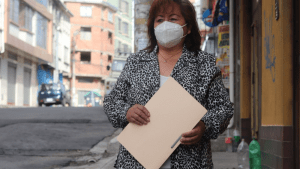
[Photo: Rodrigo Herrera]
La Paz, Bolivia
Brigida Aranda Rioja, who lives in the La Paz neighborhood of Cotahuma, was able to easily register and get documentation for her home as a result of her city’s Mayors Challenge project, which reduced the time to receive documentation from four years to three months. Correctly registering homes is critical to growing La Paz, where development is disorganized and much of the infrastructure isn’t correctly recorded. The result is overcrowding in the city center. Through the Mayors Challenge, the city is planning ways to develop nine new urban centers to re-distribute growth across the city.

(Photos: Annie Barker)
Lansing, USA
Rahmi Rewert circles letters during alphabet bingo at the Child Development Center. He’s one of the students who participated in a prototype of a reading program the city of Lansing launched to fight low literacy rates and learning loss in pre-K through 3rd grade students. Eighty-seven percent of Lansing’s pre-K students and 76 percent of 3rd-graders failed the state-sanctioned reading proficiency tests, according to Michigan Department of Education data. Through the Mayors Challenge, the city partnered with local organizations to pilot a blend of virtual and in-person enrichment classes that taught young students numbers, letters, and word construction. The city team is working to further develop the program based on feedback from community members and stakeholders.

(Photo: Emilie Bossens)
Leuven, Belgium
In Leuven, nearly a quarter of emissions are caused by motorized transportation. To help the city meet its ambitious climate goals, the Mayors Challenge team worked with residents to develop civic contracts that residents could sign to commit to using greener transportation options. “Civic contracting should ensure that people make more commitments, because then they feel more confident that others will do the same,” says Jan Mellebeek, head of local policy action, shown here taking the cycling bridge on his commute.

(Photo: Nadya Oppenheim)
London, U.K.
Petra Salva (right), Director of Rough Sleeping at St. Mungo’s, has been at the heart of the homelesness charity’s decade-long partnership with the Greater London Authority to tackle issues of homelessness in the sprawling city. She’s also part of the Mayors Challenge team creating “turnaround hubs,” where staff help people experiencing homelessness find housing accommodations, apply for credit and find employment. The short turnaround times ensure that clients re-enter the system as quickly as possible, allowing them to begin the process of rebuilding their lives and becoming financially independent for the long-term.
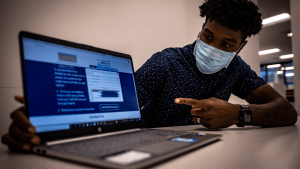
(Photo: Richard Grant)
Long Beach, USA
Ryan Shelton, an assistant at the Pacific Gateway employment agency, demonstrates the WorkLB website, which will give Long Beach residents easier access to career development connections and resources. It’s part of the WorkLB program, which helps Long Beach residents find and be prepared for the jobs that fit their unique and diverse situations. The website and accompanying mobile app cater to Long Beach residents whose circumstances make it difficult to work a traditional nine-to-five job, such as students and people with health conditions, with a focus on people of color. The system allows workers to bypass the usual resume-filtering algorithms, and instead match with employers based on their skills and availability.

(Photo: Taris Smith)
Louisville, USA
Ta’Mia Malone (left) and Alex Bouitt are two of the Louisville high school students who recently completed the Butterfly Project, which teaches data and technology skills to young women of color. The program not only prepared them for future jobs in tech, it also equipped them with skills they can use today to understand and address social and racial justice issues in their city. They learned to use data to study issues related to unemployment, health, transportation and housing in the city. With the help of the Mayors Challenge, Louisville foresees exciting possibilities to build on the Butterfly Project and expand it for students worldwide.

(Photo: Sana Ginwalla)
Lusaka, Zambia
Mayors Challenge team members and residents learn how to mine and sort waste at a workshop to test the city’s Waste2Cash program. Waste collection in Lusaka has become a pressing issue in recent years, as the lack of a comprehensive system has led to outbreaks of illness. Through the Mayors Challenge, the Lusaka City Council and the University of Lusaka are working together to develop Waste2Cash, a program that incentivizes residents to collect, sort and recycle organic waste by enabling them to earn money from it. Waste2Cash lets residents sell organic waste to be turned into biogas, a sustainable alternative to charcoal and organic fertilizer that can be used to power home ovens and rejuvenate agricultural land.

(Photo: Karis Corpus)
Manila, Philippines
Residents from the neighborhood of Barangay 899 line up to pre-register online for the GO! Manila app, which the city is developing to provide a single platform that offers easy access to all city services. Residents who don’t have internet access can register and access the app at stations like those shown above. Sixty percent of city employees have already registered, as well as a few hundred residents from Barangay 899, where the app is being piloted. The initiative sets Manila on a path to becoming an inclusive community in which city services are just a tap away.
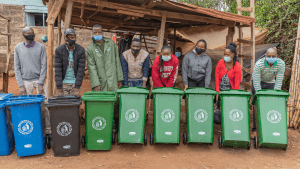
(Photo: Gathukia Mwangi)
Meru, Kenya
Traders from the Gakoromone market, the largest market in Kenya, make preparations to begin distributing bins to collect organic waste. The Meru Mayors Challenge team installed bins in the market and trained representatives to teach others how to segregate organic waste, including fruit and vegetable waste, cardboard packaging and ropes and sacks made from sisal. The gathered waste will be fed to Black Soldier Fly larvae and then used as animal feed. This behaviour change intervention, which will enable the city to process 60 percent more waste than it can collect currently, also will further Meru’s economic goals and long-term strategic plans to improve organic waste management.

(Photo: Bilal Meshanni)
Newark, USA
Lakeesha Eure (left), Director of Newark’s Office of Violence Prevention and Trauma Recovery, and Dawn Haynes (right), President of the Newark Board of Education, take a photo at a “Social Shark Tank” event to secure funding for community programs focused on crime intervention. Eure leads the city’s Mayors Challenge program, which aims to reduce crime by treating violence as a public health issue. The program includes engaging with some of the city’s repeat criminal offenders as well as funding educational programs that prevent young people from entering the criminal justice system.

(Photo: LaShance Perry)
New Orleans, USA
New Orleans residents want well-maintained infrastructure and reliable services, but a ballot measure asking for tax money to deliver these services failed — twice. Why? It boiled down to a lack of trust. But how do you define trust, and how can you measure it? Through Project Why, the Mayor’s office worked to identify and measure elements of trust. A series of “Trust-O-Meters,” such as the one shown above, allowed residents to rate the city on different elements of trust, like transparency and accountability. Through the exercise, city officials were surprised to learn that residents highly rated the city’s ability to do the work, but felt there was a missing level of transparency and communication.. By simply listening to residents and clearly communicating with them, the Mayor’s Office saw an immediate improvement in trust.

(Photo: Hwa Pyung Yoo)
Paris, France
Louise Faux of Paris’ School Affairs Directorate was one of the first to join the team developing the new Paris Climate Academy last summer. Today, the space in the heart of Paris brings young people together to learn how to combat climate change, with rooms dedicated to vegetarian cooking, upcycling clothing, creating art with recycled materials and more. The idea was developed in response to research which said young Parisians wanted to act on climate, but didn’t know what concrete actions they could take. Today, people aged 9-to-25 can go to the Academy to be trained and certified on climate actions as well as meet other young people who are passionate about the ecological transformation of Paris.
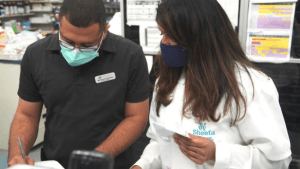
(Photo: Joseph Sir Moore)
Paterson, USA
Pharmacists test how quickly they can deliver medically assisted treatment (MAT) to those facing Opioid Use Disorder as part of the city’s Mayors Challenge project to speed treatment times. Residents of Paterson who seek help for opioid use currently wait up to two weeks to get the treatment they need. Treatment is available only at limited times each day, and while MAT is recommended, it's offered less than 30 percent of the time. The city is developing a new program that would provide MAT onboarding and prescriptions to appropriate patients within 90 minutes, every day of the week, no matter the hour.

(Photo: Nate Sicotti)
Phoenix, USA
Phoenix resident Victor (right) talks to Willa Altman-Kaough, who works for the City of Phoenix, after successfully securing a job at a Mobile Career unit event in the parking lot of a Food City store. Facing high unemployment rates, the city learned that a disproportionate number of unemployed people lacked internet access. The Mayors Challenge team designed the Mobile Career Unit to bring employment opportunities directly to residents. The Mobile Career Unit — a vehicle with desks and seating inside — also offers skills training, job openings, on-site interviews, and an opportunity to be hired on the spot.
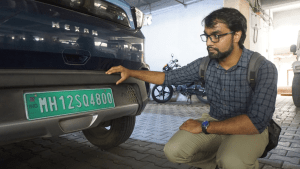
(Photo: Abhishek Gijare)
Pune, India
Mandar Patil, a senior consultant with clean energy consultancy firm RMI India and member of Pune’s Mayors Challenge team, examines a fully electric car from Pune Municipal Corporation. Pune is consistently ranked among the most livable cities in India, but the air pollution has increased rapidly since past few years due to the surge in the private vehicle ownership, particularly two-wheelers. To fight this problem faced by the citizens, the Mayors Challenge team came up with a plan to accelerate the adoption of electric vehicles in the city. Working with local stakeholders like EV industry players, citizens and other government departments, the team is developing an EV Readiness Plan for the city that focuses on replacing petroleum vehicles with clean electric vehicles for public and private transportation.

(Photo: Larissa Garrido)
Recife, Brazil
Recife’s Mayors Challenge project, "Tá com elas", is helping local women entrepreneurs like Ceiça, who runs an Afro Fashion brand. The project aims to link the city’s existing microcredit program with women-focused services that will offer professional, empowerment and financial autonomy training to 15,000 women by 2024. Ceiça says Afro Fashion is a way for her to understand her roots and who she is as a Black woman, but she struggled to keep her business afloat during the pandemic, as supply chains suffered and fabric prices rose. She says the city’s microcredit program, CredPop, saved her business.
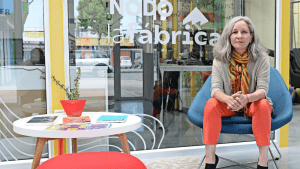
(Photo: Jose Miguel Andrade)
Renca, Chile
Claudia Labbé is Executive Director of “la fábrica” (“the factory”) in Renca, where she works closely with the city on its Mayors Challenge program to improve the lives of seniors. In Renca, more than 65 percent of seniors live in poverty, and many felt isolated and ignored during the COVID-19 pandemic. Through the Mayors Challenge, the city is creating an innovation hub where seniors can gather to help design new community projects, harnessing their talents and experience. Labbé says the project doesn’t just benefit seniors but their families and communities as well. “I believe that this can be transformed into a practical, scalable case study that can grow within Renca,” she says, “and it can also place us in the possibility of being a model for other cities.”

(Photo: Joaquim Lima)
Rio de Janiero, Brazil
Carlos Krykhtine (left), the Director of the Pereira Passos Institute, the research department for the city of Rio de Janeiro, speaks with Wallance Junior, 26, in Junior’s home. Junior, who lost the use of his legs due to an injury from a gunfight, later contracted tuberculosis due to the damp and mold in his home. Krykhtine is leading a 4-D laser scanning project to create digital maps of the favelas so the city better understands the housing conditions and structural problems facing thousands of residents and create sustainable solutions for the future.

(Photo: Anuja KC)
Rochester, USA
Chao Mwatela, the Diversity, Equity and Inclusion Director for the City of Rochester, leads a session with construction industry experts and BIPOC (Black, Indigenous, and People of Color) women who hope to break into their industry. In Rochester, where 40 percent of Black residents live in poverty, the level of unemployment among BIPOC women is far higher than among any other demographic group. The growing construction industry has the potential to create opportunity and financial stability for many residents. Through the Mayors Challenge, the city is working with these stakeholders to co-design more pathways for women of color to enter the industry.

[Photo: Mauricio Manzano]
Rosario, Argentina
Luciano Almirón lost his job during the COVID-19 pandemic, so he found work as one of Rosario’s many informal waste collectors. Eighty percent of recycled waste in the city is collected by these unofficial waste collectors. In the past, they faced dangerous working conditions and low pay. But with unemployment high during the pandemic and more people turning to this work, the city set out to improve conditions for them. Through the Mayors Challenge, the city offered support and training and ensured they bought materials from the collectors at a fair price, increasing their revenues by up to 30 percent.

(Photo: Kayleigh Huisman)
Rotterdam, Netherlands
In Rotterdam, city officials and social entrepreneurs mingle with representatives from NGOs and the private sector at an event to launch the city’s Mayors Challenge project. The project aims to increase the private sector’s involvement in employment programs by offering digital tokens that monetize the social impact for these organizations. Unemployment in Rotterdam is double the national average, but with the pandemic stretching public budgets thin, the city is looking to the private sector to support employment initiatives.

(Photo: Soumya Sucharita Dash)
Rourkela, India
Vegetable vendor Sawyer Mahato is all smiles after learning that a cold storage room is now available at the VSS Market in Rourkela. Previously, fruit and vegetable vendors like Mahato didn’t have anywhere to store unsold produce at the end of the day, forcing them to throw it away or sell it for less than its value. Through the Mayors Challenge, the city of Rourkela installed a solar-powered cold storage room where Mahato can store her unsold produce so she can sell it the following day. This innovation reduces food waste and gives vendors an opportunity to make more money off their stock.

(Photo by: Francis O’Keefe)
San Jose, USA
Karla Alverez, a project manager for community engagement in San Jose, shows local parents how to use an app the city is developing to guide them through their children’s college application process. Fewer than half of San Jose residents over age 25 have a college degree, and the process of applying can be especially challenging for first-generation college students. Through the Mayors Challenge, the city is encouraging families to earn scholarship dollars toward their children's education by learning more information about supporting their children in the application process. By empowering all parents to support their children’s college aspirations, the city is removing inequalities in this daunting process.

(Photo: Jin Huang)
Taipei, Taiwan
COVID-19 lockdowns have been especially isolating for seniors, like Shih Yu-Mei (石玉美). She is maintaining her health and mood by using a chat bot called Le Ling Zhi Dong Qu (樂齡智動趣), which was created by the city of Taipei through the Mayors Challenge. The chatbot, which seniors can access on the popular LINE messaging app, offers exercise programs as well as reminders for seniors to check their blood pressure. It even gives them the option to interact with other seniors virtually.

(Photo: Guy Yechiely)
Tel Aviv-Yafo, Israel
Young people in Tel Aviv-Yafo flocked to the Gesher Theater when the Mayors Challenge team created an experience to appeal to those under 35, with more opportunities for flexibility and social engagement. Like many cities around the world, Tel Aviv-Yafo has very few residents under 35 engaging with traditional cultural institutions like theater. When those cultural institutions suffered during Covid-19 shutdowns, the Mayors Challenge team set out to innovate ways to appeal to a younger audience—and ultimately change how art institutions in the city are shaped. In a prototype event, they created an evening at the theater that included a pre-show lounge, a terrace from which to view the show, and opportunities for discussion and social engagement. “We created this cultural experience, kind of like a home in the theater,” says Dana Schliefer, the project leader.

(Photo: Julián Ríos Monroy)
Tunja, Colombia
Members of Tunja’s Mayors Challenge team meet at a table and chairs made of cardboard. After the COVID-19 pandemic put many people in Tunja out of work, the team piloted a program to train residents to gather reusable cardboard and repurpose it as furniture. The sturdy cardboard pieces will be used in public libraries and parks throughout the city. It’s an eco-conscious way of boosting employment while reducing waste and improving public spaces

(Photo: Darlington Ojy Onwukwe)
Umuaka, Nigeria
Precious Ngozi (left) chats with a local tailor, Udoka Mbah, about Umuaka’s Mayors Challenge program to empower women and reduce gender-based violence. Ngozi works with the Umuaka Women’s Crisis Centre, whose members are leading the charge to educate other women in the city about the new resources available to them, including a new app the city is creating that will make it easier to report gender-based violence and access support services. Women business owners like Mbah are especially interested in small loans the city is considering offering to support women’s financial independence.

(Photo: Ugnė Žilinskė)
Vilnius, Lithuania
Vilnius history teacher Auksė Michailinaitė and arts teacher Giedrė Jarašūnė developed a lesson for their high school students on the creation of family coats of arms through history. And they decided to enhance their instruction with experiential learning. Here, their class visits the Palace of the Grand Dukes of Lithuania. A museum docent who has been briefed on the lesson plan shows them a real coat of arms. The visit is part of a prototype of the city’s Mayors Challenge idea, an innovative hybrid learning model that blends digital and in-person learning and uses digital tools to expand the classroom into city spaces. Inspired by remote learning during the pandemic, the program is a unique way to address capacity issues in the city’s schools. Five local schools participated in the prototype and each noted a significant positive shift in establishing a bond between teachers and students as a result of the program.

(Photo: Ethan Sheaf-Morrison)
Wellington, New Zealand
Anahera Nin (Ngati Toa iwi), left, Ashleigh Sagar (Ngati Toa iwi) and Julia Hamilton from the Wellington City Council look at the “digital twin” of the city they developed to allow residents to better visualize how their city may be impacted by climate change. A large number of Wellington residents live and work in areas that are vulnerable to rising sea levels, and the city is keen to be a leader in the shift towards a post-carbon future. The digital twin incorporates land, financial, community, and infrastructure data in a virtual map that’s easy for residents and policymakers to use. The team hopes the tool will inspire residents to get engaged in local climate action and policymaking.
